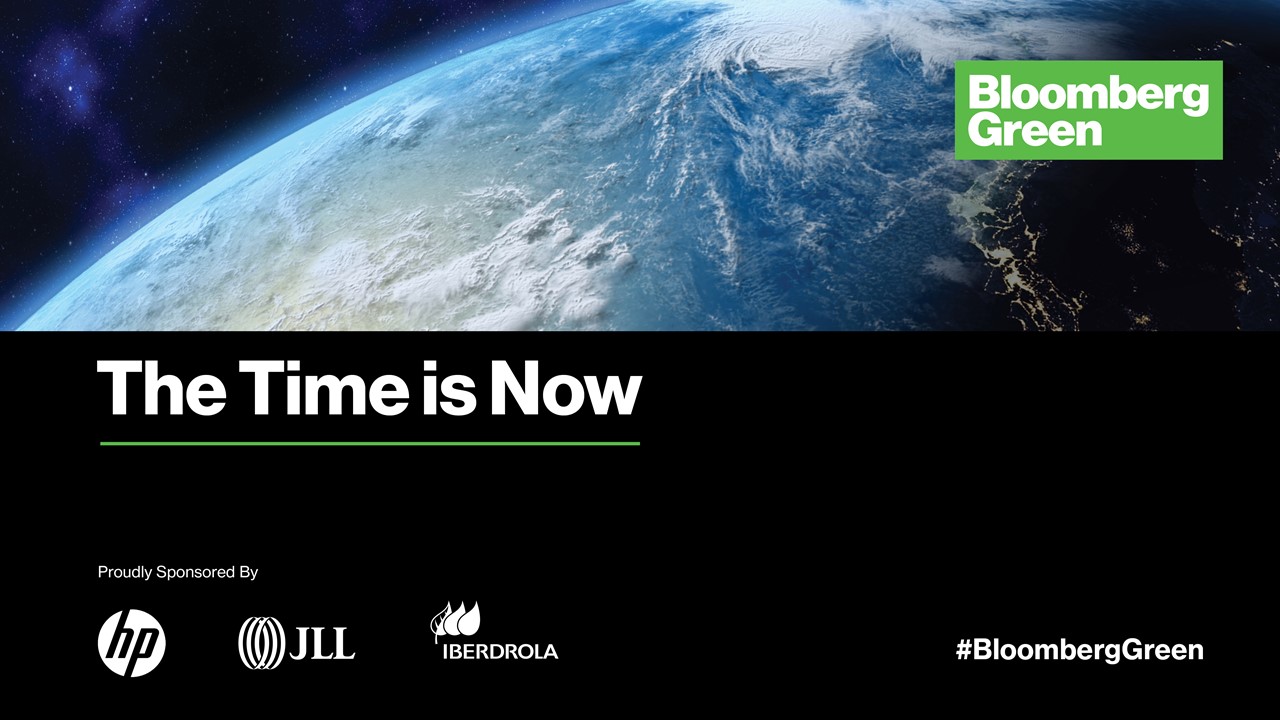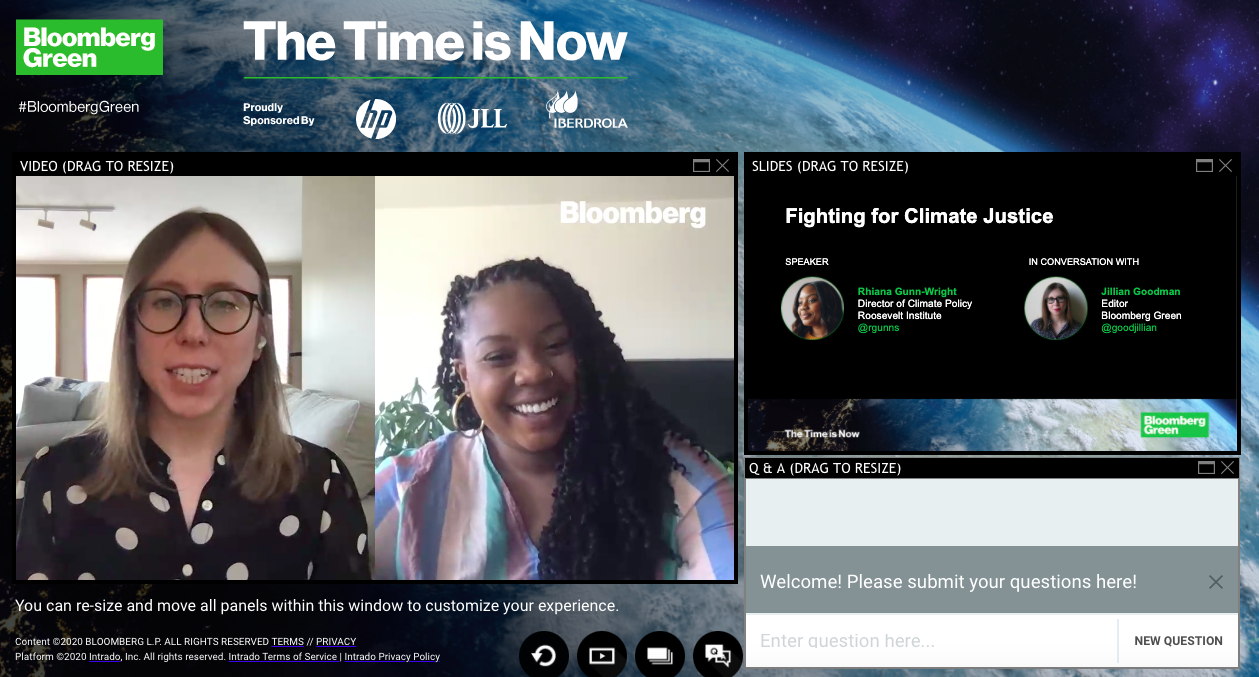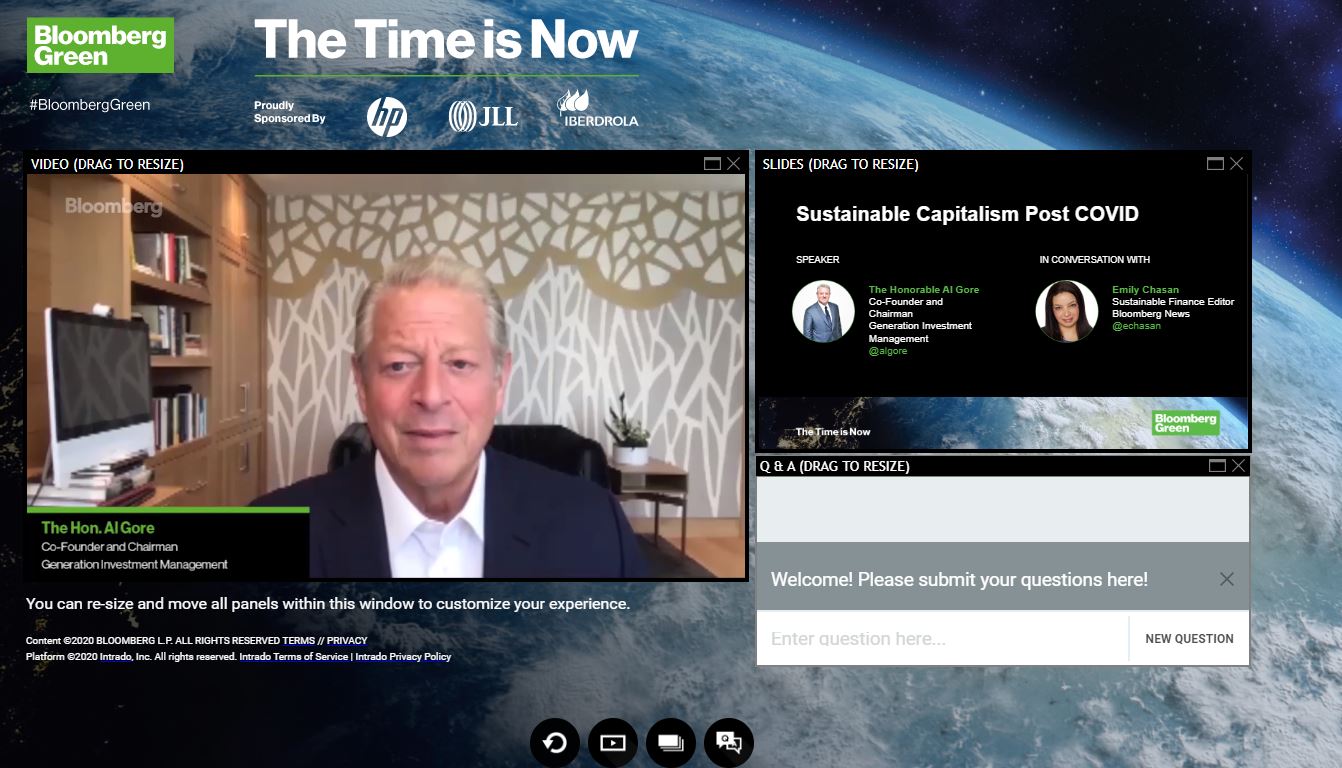By Sasha Qadri, Bloomberg Live
At Bloomberg Green’s July 21st inaugural virtual event, The Time is Now, Bloomberg Green’s editorial team, led by Aaron Rutkoff, had a series of conversations with key voices and leaders in the sustainability space. Speakers included:
- Marcelia Freeman, Senior Vice President, Capital Development, ESG, EIG Partners
- Al Gore, Former U.S. Vice President
- Rhiana Gunn-Wright, Director of Climate Policy at the Roosevelt Institute
- Lucas Joppa, Chief Environmental Officer, Microsoft
- Melanie Nakagawa, Director of Climate Strategy, Princeville Capital
- Lord Nicholas Stern, Chairman, Grantham Research Institute on Climate Change and the Environment, London School of Economics
- Emily Chasan, Sustainable Finance Editor, Bloomberg News
- Aaron Rutkoff, Executive Editor, Bloomberg Green
- Laura Zelenko, Senior Executive Editor, Diversity, Training, Talent and News Standards, Bloomberg
Click here to view video of the full discussion.

A few of the key takeaways:
- Lucas Joppa, Chief Environmental Officer, Microsoft, said that despite his company’s pledge of a billion dollars to invest in climate innovation, much more funding is needed — along with policy support. “A billion dollars is a lot and nothing at the same time. It’s a lot to mobilize in the climate space, but it’s really nothing to the total cost that we are going to have to bear to meet a 1.5 future and the price we will end up paying if we don’t stabilize our climate systems.” He also talked about the need for government policy to kick-start carbon markets and how Microsoft has evolved its perspective — from previously avoiding emissions investments to advocating carbon removal. “Carbon removal is where the markets need to be kick-started and so that’s where we are going.” Referring to emissions reductions, he added, “We need to show that this isn’t just possible but also good for business.”
- On the theme of climate justice, Rhiana Gunn-Wright, Director of Climate Policy at the Roosevelt Institute, said, “To move something with no support on one side, you need multi-racial coalitions, and that is difficult to do unless you are speaking about climate in a way that creates a more just and equitable society.” Gunn-Wright concluded that we have control over our institutions and politics, but not over climate systems nor over the emissions that we have released that are already affecting us. “So to say that politics is what is in the way is a deep misunderstanding of what we can and can’t do,” she said.

- Marcelia Freeman, Senior Vice President, Capital Development, ESG, EIG Partners, talked about the groundswell of demand for sustainable investing over the last decade, with demand push coming from pension funds, endowments and foundations. She said it is a huge opportunity for women who excel in balancing the quantitative and qualitative skill set required for ESG.
- Melanie Nakagawa, Director of Climate Strategy, Princeville Capital, shed light on the huge pressure the financial community is under both from climate demand and climate risk when it comes to sustainable investing. “We’ve had $10 billion plus disasters in the first half of 2020 so the climate risk is not just physical risk but also capital risk,” she said. Nakagawa also highlighted the fact that with more women taking on leadership roles in ESG, they are more likely candidates for C-suite positions in the future — as all leadership roles will be focused around ESG, with no carve out in the C-suite for an ESG-specific role.
- The coronavirus pandemic has created new political momentum for enacting climate policies across the globe, said Lord Nicholas Stern, who chairs London School of Economics’ Grantham Research Institute on Climate Change. “If you look at the opinion polls,” he said, “they show that people want to build back better. They recognize the old system was dangerous and they recognize that you can make change quickly. The political leaders not only have the space to do it, they are under political pressure to do it.” Stern believes that the sustainable story is the strong recovery story and it has been recognized by policy makers around the world. In Europe he sees the green recovery as strong and buttressed by governments. In the United States different geographies are moving in different directions. In China, while many see real opportunity in the new model of growth, there is opposition from vested interests in coal as well as grid structures biased against renewables — so it’s uncertain which way it will go.

- Former Vice President Al Gore said he’s encouraged by the fact that so many economic stimulus plans across the globe are focused on carbon reduction. It shows, he said, that the world has crossed a threshold “beyond which it is ever clearer that sustainable technologies are cheaper and better.” He described how Covid-19 is accelerating the sustainable revolution and accelerating the transition to renewable energy. “The pandemic has stimulated new ways of thinking, a new awakening.” Gore said while we are still in the early stages of a sustainable revolution based on new digital tools, “it’s a revolution with the magnitude of the Industrial Revolution and the speed of the digital revolution.” He concluded the event by stating he’s hopeful that the world economy will make this recovery a green recovery and a jobs-intensive one.
Bloomberg Green: The Time is Now was Proudly Sponsored By



——————————
Join the Conversation: #BloombergGreen
Instagram: @BloombergLive
LinkedIn: Bloomberg Live
Twitter: @BloombergLive
Interested in more Bloomberg Live virtual events? Sign up here to get alerts.
——————————